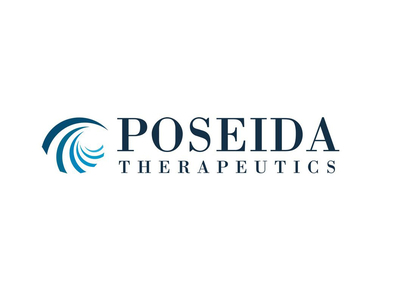Poseida Therapeutics Reports Program Updates and Financial Results for the Fourth Quarter and Full Year 2020
Poseida Therapeutics (PSTX) reported significant advancements in its clinical programs and financial outcomes for 2020, marking a transformative year following its IPO. The company highlighted ongoing trials for P-BCMA-101 and P-PSMA-101, with promising results in treating multiple myeloma and prostate cancer, respectively. R&D expenses rose to $103.5 million, while net losses increased to $129.8 million. However, Poseida ended the year with a strong cash position of $309.2 million, enabling further development of its innovative gene therapies.
- P-BCMA-101 and P-PSMA-101 trials show promising clinical results.
- Strong cash position of $309.2 million as of December 31, 2020.
- Net losses increased to $129.8 million for 2020.
- R&D expenses surged to $103.5 million, impacting financial performance.
Insights
Analyzing...
SAN DIEGO, March 11, 2021 /PRNewswire/ -- Poseida Therapeutics, Inc. (Nasdaq: PSTX), a clinical-stage biopharmaceutical company utilizing proprietary genetic engineering platform technologies to create cell and gene therapeutics with the capacity to cure, today announced program updates and financial results for the fourth quarter and full year ended December 31, 2020.
"2020 was a transformative year for Poseida, as we completed our IPO and became a public company all while advancing multiple programs and substantially expanding the application of our core technologies, enabling us to engineer a portfolio of product candidates designed to overcome the limitations of current cell and gene therapeutics," said Eric Ostertag, M.D., Ph.D., Chief Executive Officer of Poseida. "This important progress was on display in late February, when we hosted our first R&D Day, showcasing the wide breadth of our capacity in cell and gene therapies and introducing a potential new product candidate for the in vivo treatment of hemophilia A to our gene therapy pipeline. We look forward to achieving important milestones in 2021 as we continue to move our programs and platform forward."
Program Updates
BCMA Program
P-BCMA-101 is an autologous CAR-T product candidate in an ongoing Phase 1 dose expansion trial and Phase 2 trial in development for the treatment of relapsed/refractory multiple myeloma. The Company provided an update on the P-BCMA-101 program during an oral presentation at the 2020 American Society of Hematology (ASH) Annual Meeting on December 5, 2020. The interim results showed that patients treated with equivalent doses of product manufactured with a modified nanoplasmid process in the expanded Phase 1 trial achieved increases in the depth and rate of responses while maintaining the potentially best-in-class P-BCMA-101 safety profile seen with product manufactured with the Company's legacy plasmid. Additionally, at the Company's R&D Day, patient case studies were presented that clinically demonstrated the value of products with a high percentage of stem cell memory T cells (Tscm), potentially leading to better duration of response and the ability to re-respond to relapse without re-administration of product. Phase 1 dose expansion enrollment continues, with an expected update on this program later in 2021.
P-BCMA-ALLO1, the Company's first allogeneic CAR-T product candidate, is in development for the treatment of relapsed/refractory multiple myeloma and is designed to be fully allogeneic, with genetic edits designed to reduce or eliminate both host-vs-graft and graft-vs-host alloreactivity. The program is proceeding toward an IND filing, which is expected in the first half 2021.
PSMA Program
P-PSMA-101 is a solid tumor autologous CAR-T product candidate being developed to treat patients with metastatic castrate resistant prostate cancer (mCRPC) currently in an ongoing Phase 1 dose escalation trial. The Company's R&D Day included a case study of a patient with mCRPC treated with P-PSMA-101 in the low dose cohort of 0.25 x 10e6 cells/kg (~20 x 10e6 total cells) who showed a marked decrease in prostate specific antigen (PSA) expression levels of more than
MUC1-C Program
P-MUC1C-ALLO1 is an allogeneic CAR-T product candidate in preclinical development with the potential to treat a wide range of solid tumors, including breast and ovarian cancers. P-MUC1C-ALLO1 is proceeding, with an anticipated IND filing and initiation of Phase 1 clinical trial by the end of 2021.
Liver Directed Gene Therapy Programs
P-OTC-101 is the Company's first liver-directed gene therapy program for the in vivo treatment of urea cycle disease caused by congenital mutations in the ornithine transcarbamylase (OTC) gene, a condition characterized by high unmet medical need. The program is progressing and the Company expects an IND submission and initiation of a Phase 1 clinical trial in 2022.
P-FVIII-101, a liver directed gene therapy currently in development for the in vivo treatment of hemophilia A, was introduced at the Company's R&D Day. P-FVIII-101 utilizes piggyBac gene modification delivered via lipid nanoparticle, resulting in stable and sustained Factor VIII expression in animal models. Preclinical studies are ongoing that will inform the development plan and timeline to IND.
Platforms and Emerging Discovery Programs
At the R&D Day, the Company also reviewed its core platform technologies and introduced a number of emerging discovery programs. The presentation is currently available on the Company's website and included discussions on the following:
- TCR-T: This platform combines the Company's technologies to generate effective and functional off-the-shelf TCR-T product candidates with a high percentage of highly desirable Tscm cells.
- Anti-cKit CAR-T: Non-genotoxic conditioning regimens that are safer than the current standard of care are potentially possible with the Company's anti-cKit CAR-T program for hematopoietic stem cell (HSC) conditioning.
- Genetically Modified HSCs: HSCs can be modified via the piggyBac DNA Delivery System and/or the Cas-CLOVER Site-Specific Gene Editing System. CAR-HSC has the potential to be a highly effective CAR-T approach.
- iPSCs: The Cas-CLOVER System is efficient for creating knock-outs and knock-ins in induced pluripotent stem cells (iPSCs).
- Genetically Modified NK Cells: Cas-CLOVER can also be used to efficiently edit natural killer (NK) cells, or CAR-NK cells, while piggyBac can be used to effectively deliver large therapeutic transgenes to activated or un-activated peripheral blood NK cells.
For discovery programs, the Company may seek partnerships or collaborations to move those applications forward in the near term.
Financial Results for the Fourth Quarter and Full Year 2020
Research and Development Expenses
Research and development expenses were
General and Administrative Expenses
General and administrative expenses were
Net Losses
Net losses were
Cash Position
As of December 31, 2020, cash, cash equivalents and marketable securities were
About Poseida Therapeutics, Inc.
Poseida Therapeutics is a clinical-stage biopharmaceutical company dedicated to utilizing our proprietary genetic engineering platform technologies to create next generation cell and gene therapeutics with the capacity to cure. We have discovered and are developing a broad portfolio of product candidates in a variety of indications based on our core proprietary platforms, including our non-viral piggyBac® DNA Delivery System, Cas-CLOVER™ site-specific gene editing system and nanoparticle- and AAV-based gene delivery technologies. Our core platform technologies have utility, either alone or in combination, across many cell and gene therapeutic modalities and enable us to engineer our wholly-owned portfolio of product candidates that are designed to overcome the primary limitations of current generation cell and gene therapeutics. To learn more, visit www.poseida.com and connect with us on Twitter and LinkedIn.
Forward-Looking Statements
Statements contained in this press release regarding matters that are not historical facts are "forward-looking statements" within the meaning of the Private Securities Litigation Reform Act of 1995. Such forward-looking statements include statements regarding, among other things, the potential benefits of Poseida's technology platforms and product candidates, Poseida's plans and strategy with respect to developing its technologies and product candidates, and anticipated timelines and milestones with respect to Poseida's development programs. Because such statements are subject to risks and uncertainties, actual results may differ materially from those expressed or implied by such forward-looking statements. These forward-looking statements are based upon Poseida's current expectations and involve assumptions that may never materialize or may prove to be incorrect. Actual results could differ materially from those anticipated in such forward-looking statements as a result of various risks and uncertainties, which include, without limitation, risks and uncertainties associated with development and regulatory approval of novel product candidates in the biopharmaceutical industry and the other risks described in Poseida's filings with the Securities and Exchange Commission. All forward-looking statement contained in this press release speak only as of the date on which they were made. Poseida undertakes no obligation to update such statements to reflect events that occur or circumstances that exist after the date on which they were made, except as required by law.
Poseida Therapeutics, Inc. | ||||||||||||||||
STATEMENTS OF OPERATIONS | ||||||||||||||||
Three Months Ended | Twelve Months Ended | |||||||||||||||
2020 | 2019 | 2020 | 2019 | |||||||||||||
(unaudited) | ||||||||||||||||
Operating expenses: | ||||||||||||||||
Research and development | $ | 27,884 | $ | 19,212 | $ | 103,520 | $ | 60,401 | ||||||||
General and administrative | 7,476 | 4,000 | 23,029 | 18,449 | ||||||||||||
Increase in contingent consideration | — | — | — | 6,683 | ||||||||||||
Total operating expenses | 35,360 | 23,212 | 126,549 | 85,533 | ||||||||||||
Loss from operations | (35,360) | (23,212) | (126,549) | (85,533) | ||||||||||||
Other income (expense): | ||||||||||||||||
Interest expense | (852) | (920) | (3,506) | (3,553) | ||||||||||||
Other income, net | 64 | 519 | 280 | 2,559 | ||||||||||||
Net loss before income tax | (36,148) | (23,613) | (129,775) | (86,527) | ||||||||||||
Income tax benefit | — | — | — | — | ||||||||||||
Net loss | $ | (36,148) | $ | (23,613) | $ | (129,775) | $ | (86,527) | ||||||||
Net loss per share attributable to common stockholders, basic and diluted | $ | (0.58) | $ | (1.79) | $ | (3.61) | $ | (6.86) | ||||||||
Weighted-average shares of common stock, basic and diluted | 61,826,180 | 13,195,330 | 35,996,901 | 12,618,413 | ||||||||||||
SELECTED BALANCE SHEET DATA | ||||||||||||
December 31, 2020 | December 31, 2019 | |||||||||||
Cash, cash equivalents and short-term investments | $ | 309,152 | $ | 125,318 | ||||||||
Total assets | 371,484 | 146,996 | ||||||||||
Total liabilities | 109,516 | 74,334 | ||||||||||
Convertible preferred stock | - | 222,173 | ||||||||||
Total stockholders' equity (deficit) | 261,968 | (149,511) | ||||||||||
![]() View original content to download multimedia:http://www.prnewswire.com/news-releases/poseida-therapeutics-reports-program-updates-and-financial-results-for-the-fourth-quarter-and-full-year-2020-301245793.html
View original content to download multimedia:http://www.prnewswire.com/news-releases/poseida-therapeutics-reports-program-updates-and-financial-results-for-the-fourth-quarter-and-full-year-2020-301245793.html
SOURCE Poseida Therapeutics, Inc.







